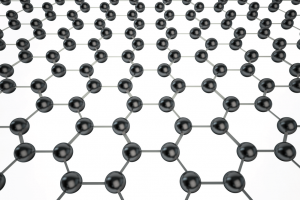What is graphene?
Essentially a 1 atom thick sheet of pencil lead, graphene is the first “2D” material we’ve ever come across and holds unique properties that boast a wide berth of potential applications. Like all other purely carbon materials, it is in the arrangement of the carbon atoms that give the material its specific properties. The difference between soft, flaky graphite and extremely tough diamonds are in how their carbon atoms sort themselves, and evidently, in how many atom layers they do so in. The hexagonal arrangement of carbon in graphite boasts strong bonds between the atoms, playing a part to graphene’s immense strength once isolated. University of Manchester researcher Andre Geim and his team were able to perform this isolation by using tape on graphite repeatedly, until only graphene remained, earning Geim a Nobel Prize in 2010 for his findings.

Alex LMX / Shutterstock
What’s special about graphene?
The unique properties the carbon sheet takes once taken from graphite into a single atomic layer are what earn graphene the title of a supermaterial. First and foremost, its incredible strength is over 40x stronger than that of a diamond. Prof. Hone at Columbia University puts this into perspective in his words, “it would take an elephant, balanced on a pencil, to break through a sheet of graphene the thickness of Saran Wrap.”. Beyond that, graphene is also a great conductor of both heat and electricity, moving electrons 200x faster than silicon. Graphene also absorbs very little light, making it translucent. With all these amazing properties in one material, the applications are countless and exciting, some currently in practice include glasses, and sporting equipment. While the current logistics of incorporating the material into transistors and other high-scale applications are yet to be feasible, further research and investment into graphene is in progress and marks an exciting development in the future.
-By: Tae woo Kim
